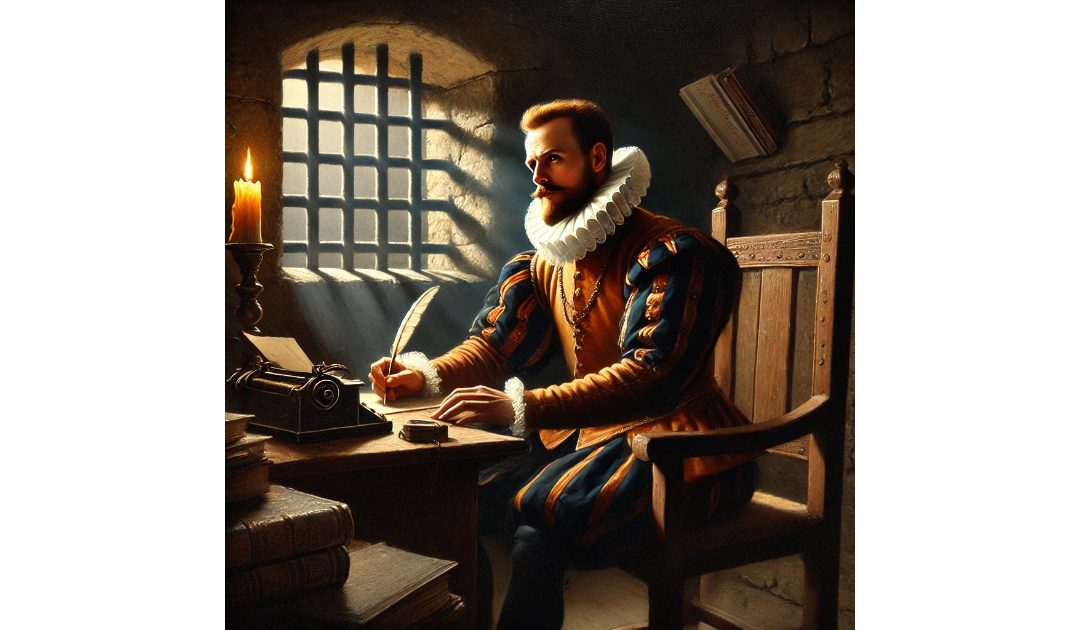Sir Walter Raleigh was freed from the Tower of London on the 20th of March, 1616. I didn’t treat Raleigh particularly well in The Spy who Sank the Armada. That’s because my ancestor, Sir Anthony Standen, worked for the Earl of Essex after Walsingham died, and Essex and Raleigh were rivals. However I have recently read the story of Raleigh’s mother, A Woman of Noble Wit, and he has risen dramatically in my estimation.
Sir Walter Raleigh was one of the most fascinating figures of the Elizabethan era—a courtier, explorer, poet, and soldier whose ambitions and adventures left a lasting mark on history. Best known for his efforts to colonize North America, his association with Queen Elizabeth I, and his eventual downfall under King James I, Raleigh’s life was a mix of grand success and dramatic misfortune.
Born around 1552 in Devon, England, Raleigh came from a well-connected but not particularly wealthy family. His early years were marked by military service in France and later in Ireland, where he played a role in suppressing Irish uprisings. His bravery and intelligence caught the attention of Queen Elizabeth I, and by the 1580s, he had become a favorite at court. She granted him a knighthood in 1585 and rewarded him with lands and monopolies, making him one of the most influential men in England.
Raleigh was a key figure in promoting English colonisation. He sponsored expeditions to North America, hoping to establish a permanent English settlement. In 1584, he obtained a charter from the queen to colonise land that would later be named Virginia in her honour. While Raleigh himself never set foot in North America, his backing led to the ill-fated Roanoke Colony, which mysteriously disappeared. Despite its failure, Roanoke was a crucial step toward the later establishment of English colonies in the New World.
Raleigh is often credited with introducing tobacco and potatoes to England, though this is probably exaggerated. Tobacco had already been used by the Spanish, and potatoes were known in Europe before Raleigh’s time. However, he did play a role in popularising both, particularly tobacco smoking among the English elite.
One of the most enduring (but probably fictional) stories about Raleigh is that he once laid down his cloak for Queen Elizabeth to walk over a puddle. Whether or not this actually happened, it reflects his reputation as a gallant and charming courtier.
As tensions between England and Spain escalated, Raleigh played a part in defending the country. Though not a major figure in the defeat of the Spanish Armada in 1588, he was involved in naval raids against Spanish ships and territories. In 1595, he led an expedition to South America in search of the legendary city of El Dorado. While he failed to find gold, he wrote a compelling account of his journey, adding to his mystique as an explorer.
Raleigh’s fortunes changed dramatically after Elizabeth I’s death in 1603. The new king, James I, distrusted him and saw him as a political threat. He was accused of conspiring against the king in the Main Plot, a supposed plan to overthrow James, and was imprisoned in the Tower of London.
Remarkably, Raleigh spent over a decade in captivity, during which he wrote The History of the World, a historical and philosophical work that showcased his intellect. Though he was eventually released in 1616 and allowed to lead another expedition to South America, his failure to find gold, and his unauthorised attack on a Spanish outpost, sealed his fate.
Upon his return to England in 1618, Raleigh was arrested again. To appease Spain, James I reinstated Raleigh’s earlier death sentence. On October 29, 1618, he was executed at Westminster. Displaying his characteristic wit, he reportedly examined the executioner’s axe and said, “This is a sharp medicine, but it is a physician for all diseases.”
Despite his dramatic downfall, Raleigh’s legacy endures. He was a key figure in England’s early colonial ambitions, a talented writer and poet, and a symbol of the daring Elizabethan age. Whether remembered as a hero or a flawed adventurer, Sir Walter Raleigh remains one of history’s most captivating characters.
I’ve posted about AI several times. I asked ChatGBT to paint Sir Walter Raleigh in the Tower of London. When were typewriters invented?

